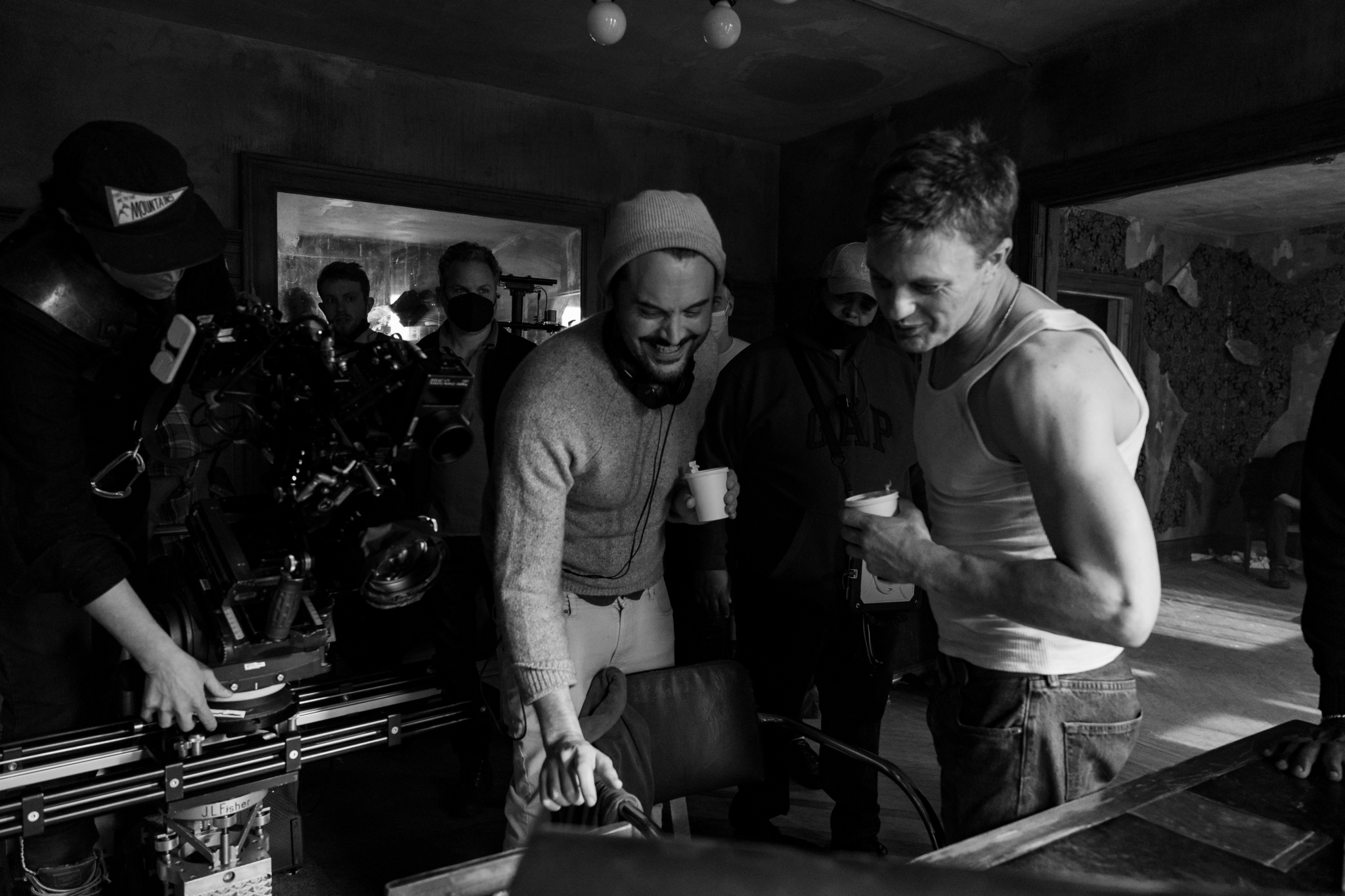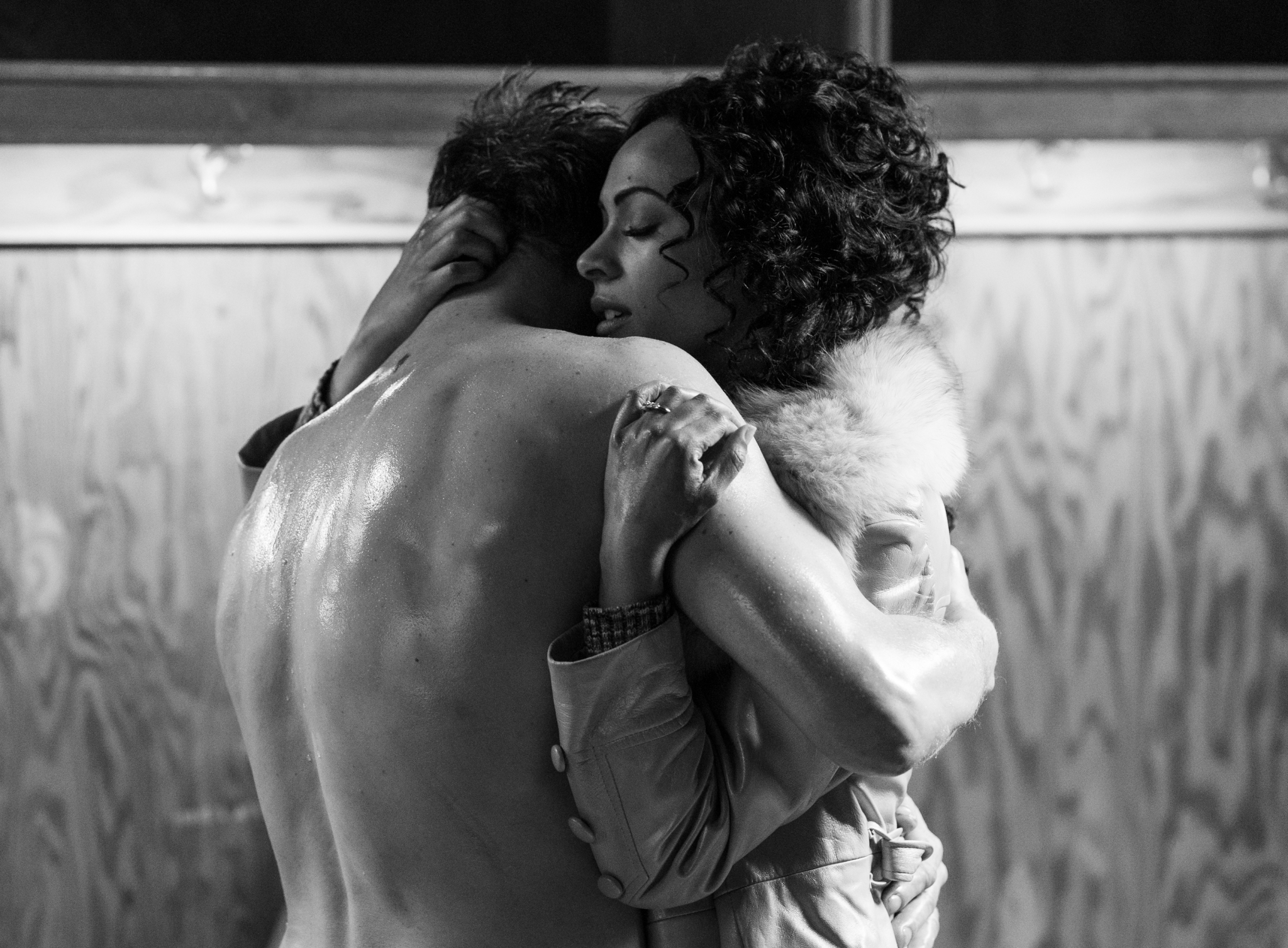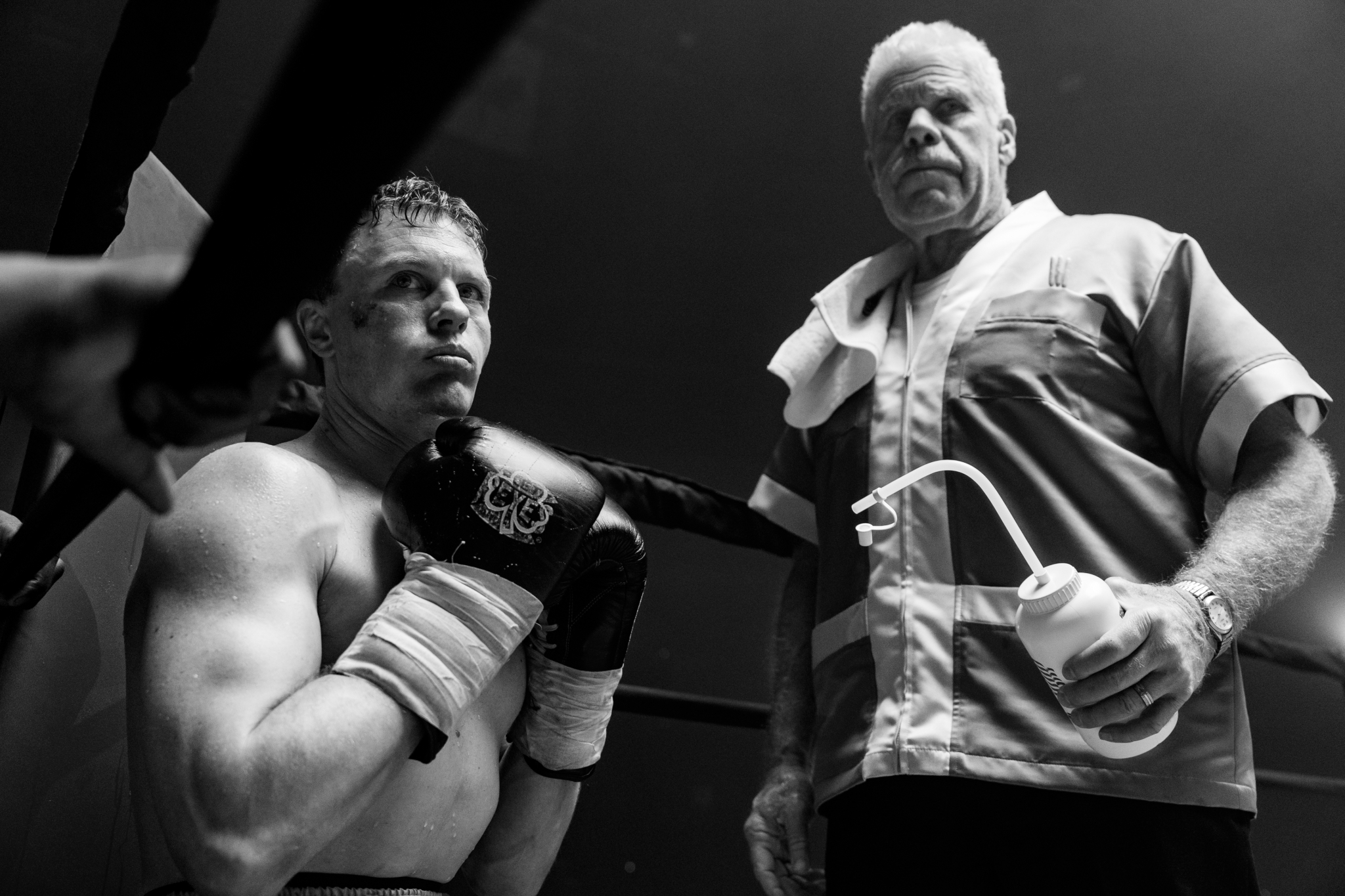

The filmmaker talks sticking to your guns, the screen power of Joe Pesci, and why we should be worried about the state of indie cinema.
What is it about the boxing film that remains so formidably linked to our emotions? From Raging Bull to the Rocky and Creed franchises to Rachel Morrison’s 2024 film The Fire Inside, how is it that the very specific image of two fighters beating each other to submission has time and time again spoken to the daily graft of the everyman? To director Jack Huston, whose debut feature Day of the Fight is the perfect example of such a phenomenon, fighting in the ring is no different to fighting it through the human experience. “In boxing, you can lose twelve rounds, up until the last second, and you can win a match,” he says, “that’s such a great life lesson. You can lose almost everything, and still, you can win in the final beat. That’s life, man.”
Set in 1989 New York, Day of the Fight follows pro-boxer Michael Pitt as Mikey, down-and-out after a considerable stint in prison and gearing up for his first major fight in years. As the day of the fight arrives, he embarks on a journey through the city, visiting various people from his past, seeking guidance, forgiveness, a second chance—closure. Mikey’s 24-hour voyage takes him to a retirement home, where his estranged father (played magnificently by none other than Joe Pesci) sits, dementia-ridden and in a vegetative state; to a church, where an old friend and now-pastor (John Magaro) waits at confession, and to the apartment of ex wife Jessica (Nicolette Robinson) and his young daughter, in the hopes of winning his family back.
“It feels a bit like A Christmas Carol, except he’s visiting the ghosts,” I say to Huston, who grins at the thought: “it sort of is, isn’t it?” The original seed for Day of the Fight, though, was more Homer than Dickens, with Huston envisioning Mikey’s story as an odyssey through his own personal purgatory: the city as the styx, the subways and yellow taxi cabs as the vessels carrying him to elysium or the underworld, depending on how the day goes.
Shot in stark black and white with brief splashes of colour, it may be easy at first glance to write Day of the Fight off as a stylistic homage to Raging Bull. That’s not the case. There are certainly hints of Scorsese’s seminal sports movie running through the film’s bloodstream, as there are hints of Stanley Kubrick’s 1952 short documentary, with which Day of the Fight shares its name, but to Huston’s credit, every decision made behind the camera bursts at the seams with vision and intention. He makes clear that it’s the spirit of those films that he is most conscious of letting influence him. “My favourite films growing up were the ones that found complexity in the human condition—those are the films that haunt me…. Marty said that Raging Bull is about a man putting his house in order. This carries that same philosophy.”
Below, Huston talks sticking to your guns, the screen power of Joe Pesci, and why we should be worried about the state of indie cinema.
Luke Georgiades: I enjoyed watching the film for the second time last night—there’s a lot I picked up on that I didn’t the first time around.
Jack Huston: I find it’s one of those films that actually works better the second time. There’s so much the audience is taking on in the first viewing that the second viewing is a cathartic experience, because you understand where you’re gonna end.
LG: Was that by design?
JH: A lot of people have come up to me about it. It’s a lot to process the first time. It’s an emotional ride. You leave the cinema and, hopefully, it’s brought into question the relationships in your lives. Old flames, past regrets. The second time, you’ve understood the film the way you want to understand it, and so you can now look at it more objectively as a movie.
LG: It felt a bit like a cozy, comfort watch for me during my second viewing. It’s strange to say that about a boxing movie, but maybe it’s the quiet nature of the film that encourages that response.
JH: It’s about introspection. It’s the penitent man who’s on a redemptive journey, travelling this road and apologising in a very selfless way to those he’s loved and hurt. He’s not asking for forgiveness, because what he realises is that true forgiveness can only come from within. Anyone can say they forgive you, but until you forgive yourself you’ll always be trapped inside of that prison.
There’s something quite beautiful about the period [1989]. It was a quieter time, before the technological boom. You would literally sit on the tube with a book, or your walkman, or with nothing at all, and just think about stuff—who you’re going to see, who you’ve just seen, the choices you’ve made throughout the day. They were great moments for reflection. You’d look around and people would be staring. If you get on the tube now, nine out of ten people, without question, will be on their phones.
LG: If my phone runs out halfway through the commute I instinctively panic about the thought that I might suddenly have to face my own demons.
JH: [Laughs] exactly! I’m the same. It’s just the time we’re in. We’ve got to challenge ourselves a bit more. On Wednesdays and Fridays, leave your phone in your bag, look around you, take notice of the world.
LG: How do you feel the New York setting plays into the narrative here?
JH: My daughter was born in New York, and I lived there for a bit. New York is one of those great cities because the minute you actually live there you become a New Yorker. The transience of what that city was and what it’s been and how people have arrived there…it’s the city in America with its arms open. The moment you arrive you’re accepted by it. Just by living there, you become a local, whereas everywhere else in the world it takes years, if not decades, to be accepted as a local. New York is an open armed community of the most diverse groups of people, and they’re all a meaningful part of it.
LG: I think the structure of this movie inherently works seamlessly with the city in that way. What inspired that?
JH: I asked myself the question, “if you only had one day, who would you visit, and what would you say to them?” Mikey understands that he’s knowingly walking towards possible death. Initially I put that moment with the doctor in the latter part of the movie, so you don’t find out about the possibility of an aneurysm until the last minute, but i ended up taking a note out of Hitchcock’s book: two people sitting at a table having a conversation and a bomb suddenly going off is one thing, but showing the audience the bomb at the beginning of the scene, and have them waiting for it to go off, is how you get people to invest. Mikey’s mortality was our bomb. The threat of death raises the bar in every scene in the film, and takes away a certain amount of sentimentality, because without that bomb, it could be a little overkill.

Michael Pitt and Nicolette Robinson in Day of the Fight (dir. Jack Huston, 2023)
LG: Is it hard with a story like this to measure the right amount of sentiment?
JH: It’s about finding the balance. Some people use “sentimentality” as an icky word. I find it the exact opposite. I’m hugely sentimental, I hold on to things very dearly. In today’s world there’s a certain amount of cynicism that makes people think, “how dare you trick me into feeling?!” Hang on a second, isn’t it the most wonderful, natural thing in the world to feel something? I wanted to make something that everyone can find themselves in. I want people to leave and think, “God, what regrets do I have that I’ve been holding on to for a little too long?”
LG: This movie shares its name with the short film by Stanley Kubrick. Was that intentional?
JH: I’ll tell you what, I’m the first to give credit where credit’s due: I watched that 15 minute documentary short where not much happens, and what it did was remind me of a simpler time of film, where the story was allowed to be straightforward because the complexity came from human interaction. My favourite films growing up were the ones that found complexity in the human condition—those are the films that haunt me.
LG: You had to fight for Michael Pitt to be cast in this role.
JH: We had to fight for everything, and Michael was the persona non grata at the time. He’ll be the first to tell you he’s had his ups and downs in Hollywood, and when the film was coming about it was, quite publicly, a difficult time for him. But it was never in question to me. Every word was written for him. I’m a loyal person, and I believe you stick with your people, and the minute you sacrifice your integrity once, you’re going to be asked to do it for the rest of time. Shooting in black and white was one of them, and Michael Pitt was another. You’ve got to stick to your guns, otherwise you’ll regret it for the rest of your life…which is kind of what the movie’s about.
LG: What you’ve described as Michael’s experience of being down and out feels so very true to the character in the film.
JH: Exactly right. To me, Michael is like Brando at the time. He’s calling me in character. Michael is Mikey.
LG: Tell me about Joe Pesci.
JH: I wrote the part for Joe, and the reason I decided to do so was because of his music. Joe’s a wonderful musician and a beautiful singer. I heard him sing, and it reminded me of when my grandmother was suffering from dementia, and music would pull her back. She would have these brief spots of clarity when certain songs were playing. I approached Joe through his musical ability, and that’s what inspired the role, and I don’t think anyone has ever spoken about him as a musician first. I think he quite liked that. Music is another character in this film. Mikey’s never without his earphones. His father was a musician, his ex wife is a singer. The score, the needledrops. It’s all around him. Joe was important to getting that right.
LG: Both of my grandparents currently have dementia and we also use music to get through to them. It’s incredible how much of our memory is instinctually tied to music.
JH: That’s amazing. Music is amazing. I would do the same. We’d put a piece of music on for my gran and she’d start singing along to it. Then she’d be normal for a few minutes afterward.

Michael Pitt and Ron Perlman in Day of the Fight (dir. Jack Huston, 2023)
LG: How was your experience directing Joe?
JH: The day we shot with Joe was our second day of shooting. If he didn’t show up the entire movie would have come crashing down, because it was contingent on Joe being in the film. And Joe likes to keep you guessing till the very last second, so when he did show up there was a huge sigh of relief, and then you realise you have to start directing him. But, in that situation, there’s not much direction. He brings everything. He’s magic to watch. The scene between him and Michael is such a powerful moment because you think Joe’s not doing anything, and he’s actually giving you everything. That’s the power of Pesci, man. He doesn’t have to speak for him to give you one of the great performances. People try to give the kind of performance in an entire film’s runtime that Joe Pesci can give in half a second with nothing but his eyes.
LG: At what point did directing become an itch you wanted to scratch?
JH: It wasn’t that I wanted to, I had to. I had to feel as if it would kill me if I didn’t make this movie. And I loved it. The best part was making it, everything else has been fucking impossible. Getting this movie was like hell. Getting this movie distributed has been hell. It continues to be hell. We’re in an awful moment in independent cinema right now where people just aren’t showing up. They’re showing up to the big films, and the little films are falling through the cracks. But what people don’t understand is that the more these films fall through the cracks, the less will be made, and at a certain point, people won’t be given “first films.” They won’t be able to discover the next Spielfberg, or Coppola, or Scorsese. That’s how they started, they didn’t go and make their monster blockbuster to begin with. Now the studio’s are screwing us. So I’m a massive advocate of supporting and preserving independent cinema, whether you like the movie or despise it. I’m a film lover, and it’s a tragedy, the idea that we might be losing the next generation of great filmmakers because no one wants to show up for independent cinema.
LG: What was your vision for bringing the final fight to life?
JH: We were meant to have four days to shoot the fight, but then we only had a day and a half. Initially I was going to shoot it round for round, but the less money and time you have, the more you’re forced to get creative. Because you have to fix things, but you don’t want to fix something and sacrifice the goodness of it, you have to somehow make it better than it would have been even without the obstacle in your way. We did choreograph a fight, but once we got in the ring we realised just how long choreography takes. When you’re choreographing something, you’re suddenly having to follow the set rules of that choreography. It takes forever. We literally had no time, so I asked them to trust that I had the edit in my head, to trust that I could just take them to different areas, to get what I needed and to know that I could build the fight from what I captured. I knew the structured beats I had to hit, but the in-between was very loose. Michael had been training as a boxer, and we had him opposite Cameron Williamson, a pro, so if you look closely at that fight you can see a lot of real contact.
LG: Why does this kind of redemptive, introspective story work so well paired with boxing?
JH: In boxing, you can lose twelve rounds, up until the last second, and you can win a match. That’s such a great life lesson. You can lose almost everything, and still, you can win in the final beat. That’s life, man. You just need to be willing to stick it out. Marty said about Raging Bull that it’s about a man putting his house in order. This carries that same philosophy.





